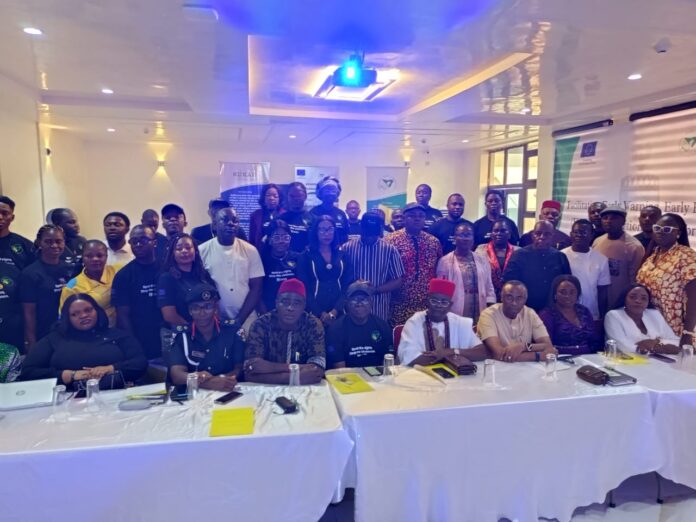Ahead of the November 8 Governorship Election in Anambra State, the Kukah Centre, secretariat of the National Peace Committee, has inaugurated an Early Warning, Early Response, EWER System in the state.
The system comprises representatives from the 21 Council Areas of the state, known as the Early Warning Team, who would identify violence triggers and raise an alert, so that members of the Early Response team, who are stakeholders with institutional authority, can intervene.
The system complements the upcoming Peace Accord facilitated by the NPC, which all the governorship candidates of the various political parties would sign, and focuses on detecting and flagging early risks of electoral violence, for prompt attention.
The inauguration of the system brought to an end, a four-day workshop in Awka, organized by the Centre, aimed at strengthening trust, coordination and accountability during the electoral process
Speaking during the inauguration, the centre’s Project Manager, Bar Asabe Ndahi said the success of the system would not be measured by words, but how faithfully members transform their commitments into action.
She described the engagement as a call to responsibility targeted at ensuring early warning led to early response, while every piece of information triggered timely, effective action.
She said, “Over the past days, we have deepened our understanding of principles and practice of Early Warning and Early Response; from community engagement and data collection, to analysis, reporting and coordinated response.
“Together, we have tested our systems, reflected on our challenges, and strengthened our collective capacities. Today, we move from knowledge to action.
“As agents of resilience, we will define our roles together and take the important step of formally adopting the Framework and Guiding Principles that will guide the EWER System going forward.
“This is not just another meeting of stakeholders; it is a call to responsibility. The November 8 elections present both risks and opportunities.
“Our task is clear: to ensure that early warning leads to early response, and that every piece of information triggers timely, effective action.”
The Kukah Centre’s Monitoring Evaluation and Learning officer, Ms. Obafemi Deborah said the engagement aimed at strengthening coordination and building a truly inclusive multi-stakeholder framework for peace in the State.
“The workshop highlighted the goal of shared responsibility, so as to reduce the burden on one actor, while building synergy to promote transparency, accountability, and enhance credibility of peace efforts in the elections,” she added.
Appreciating participants for standing as torchbearers of peace, Obafemi charged them to be proactive, accountable, and resilient to ensure that “peace must prevail, elections must be credible, and our communities must be safe.”
The workshop, with support from the European Union under the EUSDGN programme, featured the presentation of the community action plan, adoption of the framework and guiding principles, as well as signing of commitment forms.
Also speaking, traditional ruler of Umueri Kingdom, Igwe Sir Ben Emeka commended the Kukar Center for the programme, urging participants to ensure the lessons were cascaded to the grassroots.
He said, “Last election, there was so much tension occasioned by rumors of war. But the election was eventually held because Anambra people have become wiser. In fact, it was almost the freest, though with low turnout of voters.
“This time around, we expect much improvement. I call on all eligible voters to come out in large numbers and exercise their rights.
“The security agencies have assured of adequate security. As an off-cycle election, more security will be deployed from across the country.
“There will not be any room for violence or fear of exercising franchise. Your vote will go a long way to ensuring the emergence of the most qualified candidate.
Other dignitaries at the workshop included Chuka Nnabuife and Chris Azor, representing government and Civil Society Organisations respectively, the CAN state chairman, Joseph Nweke, IPAC, Police, NSCDC, religious media representatives, among others.



